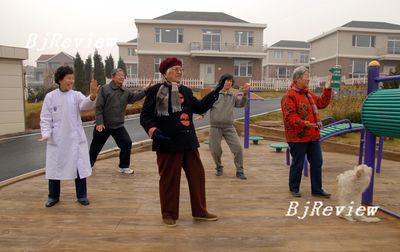|
Yang told Beijing Review that the development of social welfare for the elderly in Dalian in the last five years has exhibited three characteristics. First is the exploration of new models to satisfy the different demands of elderly citizens of different age groups and economic capacities. Second is to increase the proportion of elderly people enjoying government living subsidies. Third is to learn from nursing homes in Japan. One reason for this is that Dalian is geographically close to Japan. Another is that as the most rapidly aging country in the world, Japan has accumulated a wealth of experience in providing social services for the elderly. During the 2005 Aichi Expo, Dalian Civil Affairs Bureau sent a delegation to attract investment and technical cooperation from Japanese companies involved in elderly care. This made Dalian the first city to promote foreign investment in caring for the elderly.

"In the past, government welfare for the elderly has been mainly confined to taking care of elderly people without children and income at government-run homes for the elderly. Now the government's increased financial strength and people-oriented governance guidelines will enable a larger proportion of elderly people to enjoy social benefits," said Yang.
New services
In 2004, Minister of Civil Affairs Li Xueju called upon civil affairs agencies of different levels to learn from Dalian's diversified models.
One new model is that the government issues bills to elderly citizens who have financial difficulty but don't want to move into government homes for the aged. The bills, printed with different face values, can be used to pay for the employment of government-trained housekeepers and lunches at a discounted price at government-run elderly citizens leisure centers.
Several agencies to care for the elderly have been set up in Dalian. By calling the hotline number of these agencies, elderly citizens can get help in choosing a nursing home that suits their demands, booking home delivery of heavy consumer goods such as flour and edible oil, free psychological and health consultation, and book accommodation at resort communities for the elderly when they want to travel to other cities in China. The government offers tax exemption incentives to these companies so that their services can be free or priced very low.
Since homes for the elderly cannot provide enough beds to meet the growing demand in Dalian, the city government has also started to offer economic incentives to private homes for the elderly so that more private investment can be injected into this area.
Yang said in Dalian elderly people in financial difficulty can either enjoy government-subsidized housekeeper services or live in homes for the elderly where the government pays part or all of their expenses; well-off elderly people can live in resort communities for the elderly in Dalian or other cities; the elderly who like the atmosphere of a big family can choose a home according to their financial capacity; and the elderly who don't want to leave home can go to nearby leisure centers to do exercise, dance, play cards or chat with other elderly people.
"We really cannot afford to waste any time in improving social welfare for the elderly. Since China started to implement its family-planning policies in late 1970s, the first generation of parents with a single child will turn senior citizens in a few years. Elderly people in an extended family may need more than their children can provide," said Yang. | 